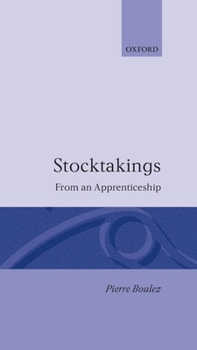Stocktakings from an Apprenticeship
In these essays, the leading French composer and conductor Pierre Boulez explains many of his most significant ideas about music. The essays are divided into four parts, the first three concerned with common preoccupations (aesthetic, technical, and polemical) and the last a collection of entries intended for a music encyclopedia. Boulez offers penetrating and provocative analyses of the music of the major figures of twentieth-century music including...
Format:Hardcover
Language:English
ISBN:0193112108
ISBN13:9780193112100
Release Date:September 1991
Publisher:Clarendon Press
Length:352 Pages
Weight:1.55 lbs.
Dimensions:1.1" x 6.4" x 9.2"
Customer Reviews
1 rating
documentary in value:essays of a young innovator
Published by Thriftbooks.com User , 24 years ago
While riding on the Paris Metro in the early Forties,during the War, a young Frenchmen had turned to his mentor and exclaimed that culture was at an end point , who will reorganize music, "You will,Pierre", said Messiaen.This collections of essays has now fascinating documentary value,for Boulez has moved on we all know, to larger realms in both universes of conducting and composition, and unpretenciously has kept the vision Messiaen had of his young student. Yet Boulez's aesthetic has not undergone a metamorphosis that is unrelated not totally unrecognizable from his youth.And all these essays are reflections and position papers, analyses,technical points like Sprechgesang and encyclopedic like entries. All were a means toward a comprehension of the situation in music at the end of the Second World War.The analytical essay "Stravinsky remains" is perhaps the most valuable item here . This is a dissection of his Rite of Spring, how the rhythm works like cells being placed together into mosaic-like patterns,creating textures,but truncating the rhythmic identities. "To the farthest reach of the fertile country" is an essay here inspired by a quote from Paul Klee, who has remained an enduring inspiration to Boulez to this day. This essay is on the implications of electronic composition, which in the early Fifties represented a new universe of sound and its conception. It was also dangerous, for how will it enter the realm of culture and creativity, how will electronics interface with the expressive concerns of form and content, and sonic manipulation. Recall that Boulez in his youth was a fiery activist for the cause of serial composition. Anyone who didn't follw this cause was useless and unimportant.He, for instance called for all opera houses to be burned to the ground, and loathed the likes of Verdi or Puccini exclaiming the vulgarity of their music. He also led jeering sections at concerts. But all this soon, to use his words, stopped,Boulez stopped barking like a dog outside. The infamous and misunderstood article "Schoenberg is Dead" is included here. Boulez never meant this title in a derogatory way, simply a ubiquitous use of the French phrase, the "king is dead", referring to the French Revolution. All Boulez meant was indeed modest, that Schoenberg's conception of the dodecaphonic language simply didn't extend itself into all the parameters of music.This is true of form in particular, where Schoenberg had retrogressed utilizing Baroque forms situated within atonal means. All of the grande auteurs that Boulez later conducted for the next thirty years are discussed in essay form: Alban Berg, Maurice Ravel, Claude Debussy, Stravinsky and Schoenberg. There is also an essay on "Alea", the indeterminate aleatoric idea which fascinated Boulez at this time the Fifties, and triggered his lifelong interest in Mallarme. His Third Piano Sonata was the focus of this concept of introducing performative freedoms




